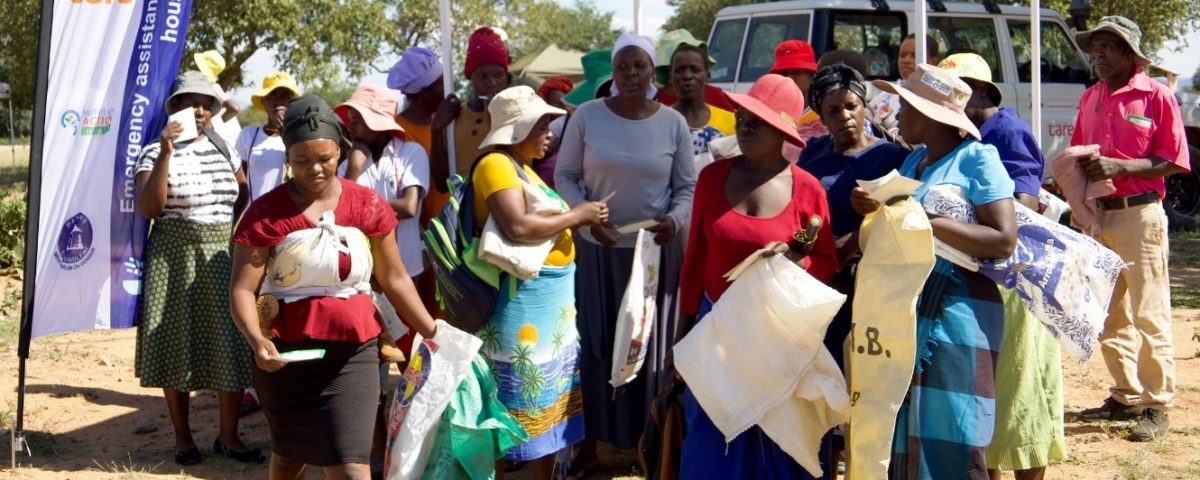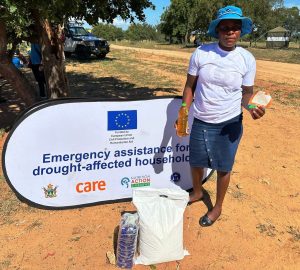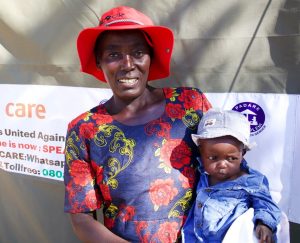
A good turn deserves another as Dorcas Moyo donates to Victoria Chitepo Hospital, Zororai Old Peoples Home
April 23, 2025
Manicalnd ZNCC business awards roar to life tonight
May 30, 2025ECHO food voucher assistance gives Marange families a lifeline

European Civil Protection and Humanitarian Aid Operations (ECHO) food voucher assistance beneficiaries in Marange waiting for their monthly groceries.
Evidence Chenjerai
It’s still early hours of the day and the heat is already unbearable at Zvipiripiri business centre in Marange Ward 16, about 120km south west of Mutare. The weather pattern is the norm for the area which falls under natural regions IV which is too dry for successful crop production without irrigation. Millet and sorghum are the common crops grown in this region. Excited chatter can be heard among the villagers gathered at the business centre to receive food vouchers under the food assistance programme for vulnerable, drought-affected households in Mutare Districts, funded by the European Civil Protection and Humanitarian Aid Operations (ECHO).
In Mutare District the project is implemented by Care International Zimbabwe in partnership with Nutrition Action Zimbabwe (NAZ) and Padare Men’s Forum where they provide life-saving assistance to people affected by the drought in priority cereal-insecure districts through food voucher assistance.
Ketura Mhandu, 31, from Nyamadzawo village, waits patiently for her turn to receive her family’s vouchers. Mhandu’s husband who is visually impaired is a beneficiary under the category of food poor due to his disability. Mhandu’s is part of a polygamous family which includes her four children and her husband’s other children with his second wife. She says the ECHO project has been a great relief for her as they barely had enough food before.
“We rely on farming but his year the rains were a bit too much than what we normally have, so the crops were affected so as a result we did not harvest much,” said Mhandu. Mhandu added that due to his visual impairment, her husband cannot work and she and her sister wife do odd jobs to fend for the family.
“We used to survive on rentals from his father’s house in Harare, but that has since been stopped due to family squabbles and we now rely on piece jobs and handouts from some of my husband’s friends. The coming in of ECHO has taken off at least one of our problems of food,” said Mhandu.

Shingirai Saruchera
Shingirai Saruchera, ECHO project team leader said beneficiaries are drawn from the Department of Social Development register adding that when implementing the project, NAZ is in charge of the nutrition component, Padare on gender issues and protection, whilst Care International is in charge of the food distribution part.
He said in Zimbabwe, the ECHO food assistance program for vulnerable, drought-affected households is being implemented in Gokwe North and Mutare Districts, targeting 24,800 individuals comprising of 12,896 women and 11,904 men. In Mutare District there are 11 900 beneficiaries and in Gokwe North 12 900 beneficiaries.
Saruchera added that Mutare Rural was given a budget of 853,000 Euros for the project which will be running from January 2025 ending July 2027, however the food distribution programme will end in April this year. Selected households receive commodity vouchers each month per person, which can be redeemed for a food basket comprising of cereal 10kgs, plant protein (beans) 1.5kg and cooking oil 750ml, based on the verified number of people per household. He added that the programme is in alignment with the Government’s Food Deficit and Mitigation Strategy (FDAS).
“We are riding on the already existing register from the Department of Social Development (DSD). Upon verification and validation of the list we print vouchers for each household and beneficiaries have a five days period to redeem the voucher at selected contracted shops.” said Saruchera

One of the Marange women beneficiaries of the food assistance programme after redeeming her voucher.
When people gather Padare as part of the gender protection component addresses villagers on Gender Based Violence (GBV). “In times of crisis, GBV cases rise and it impacts mostly women,” added Saruchera.
According to a UNFPA Zimbabwe report, in Zimbabwe, about one (1) in three (3) women aged 15 to 49 have experienced physical violence and about one (1) in four (4) women have experienced sexual violence since the age of 15. Approximately 39.4% of women have been subjected to physical violence, and an estimated 11.6% have faced sexual violence. states a World Bank report.
“We use malnutrition as an entry point to food, we focus on enhancement of malnutrition capacity, building of existing structures of village health workers (VHW) and logistical support in terms of movement of ready to use therapeutic food.” added Saruchera.

Joyce Fenyere
Joyce Fenyere from Nyamadzawo village in Marange, took custody of her granddaughter from her mother after she fell sick. She said the now one year four months old infant looked sickly when she took her at six months old. The child did not breastfeed as her mother had complications soon after delivery and to make matters worse, because of no money did not have a balanced supplementary feed. Upon visits to a healthcare centre her granddaughter was diagnosed with severe malnutrition.
“When I took her from her parents, her Mid-Upper Arm Circumference (MUAC),a measurement used to assess a child’s nutritional status through measuring the circumference of the upper arm, was at 10, but my last visit to the clinic reading is now 11,8,” she said. Fenyere says she has ECHO project to thank for that improvement. “There was no enough food where she stayed but thanks to the ECHO project she now has a balanced diet. She loves beans such that when we miss her feeding time, she starts to cry but once we have fed her she starts playing around,” said Fenyere.
As the food distribution component of ECHO comes to an end this April, Fenyere said she now has knowledge of what to look for to feed her granddaughter going forward. “The improvement is visible for all who know how she was when she started staying with me, so I will continue to work hard so I can get the same foodstuffs to feed her,” said Fenyere.
A VHW, Vimbiso Zvavanhu from Nyamadzawo village in Marange who was trained by ECHO on nutrition says she has noticed a change in lactating mothers and children she works with. In March she says she took the weight (scale) and MUAC of 85 children below five years and five were on yellow which meant moderate acute malnutrition and three were on red which meant severe acute malnutrition.
“When we come across these cases I refer them to a healthcare centre but of the eight, only two went to the clinic,” said Zvavanhu. She said certain fates do not allow treatment with modern medicines and the area she works in is one such area. “I however make follow ups with the mothers and encourage them to adhere to the four star diet comprising of our staple food, animal source foods, legumes, vitamin-rich fruits and vegetables in the absence of medical care,” said Zvavanhu. She said as VHW workers they are also trying to engage apostolic church leaders to send their children to clinics for medical checkups. “Some are slowly coming around and openly going to the clinic and others are going secretly, but a lot still needs to be done,” she said..
Joseph Mwanaka, Manicaland DSD social development officer said beneficiaries were identified using an already existing master register wholly owned by government. “We had indicators we used to select beneficiaries from that register, mostly food poor. Some cannot work because of chronic illnesses, age, child headed families, elderly over 65 and those with disabilities, so they qualified,” said Mwanaka. He said the first phase was done by government with Care International Zimbabwe coming in later to assist in the peak hunger period.
“Care is complimenting us as some of the beneficiaries are pregnant, lactating mothers, and the elderly, who were not on our register and benefiting from the government programme. This was done in collaboration with Village Health Workers, local leadership, traditional leaders and community volunteers to identify deserving beneficiaries,” he said.
Mwanaka said when the food parcels programme end, government will continue with the food deficit mitigation strategy. “Depending on the outcome of the ZIMLAC results (the Zimbabwe Livelihoods Assessment Committee, a consortium that conducts annual assessments of rural and urban livelihoods in Zimbabwe to inform food and nutrition security policies), we will know the extend of hunger, we will continue to monitor as there are some cases identified and referred for relevant service provision so follow ups are needed,” he said.
Mwanaka said this will be done through community workforce who are an extension of government at community level such as VHW, community and childcare workers who do child protection. “We will continue to capacitate them even to match emerging issues like climate change,” he said.


